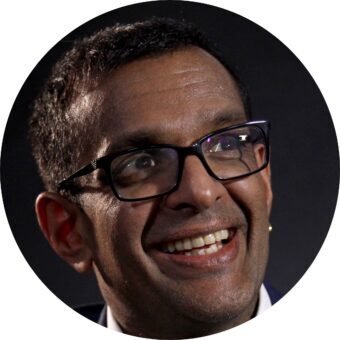
Anand
Menon
Anand Menon is Professor of European Politics and Foreign Affairs at King’s College London. His research areas include conflict and security, and British politics. He is co-editor of the Oxford Handbook of the European Union, a member of the Strategic Council of the European Policy Centre, and an associate fellow of Chatham House. He is also the director of the UK in a Changing Europe project.
Transcription of the video
Which domain or aspect of social life will show the most significant positive societal and/or psychological change in response to the pandemic?
We are probably going to be more appreciative of people we didn’t appreciate enough before. That might be friends and neighbors that have kept each other going through lockdown that might in our country, at least, be health service workers who have been the focus of a lot of sort of attention during this. It might even be immigrants, because the Prime Minister himself came out of this thanking people who weren’t from the UK who helped save his life when he went into hospital. That’s the first thing. The second thing is that the crisis has helped bring to the fore the issue of economic inequality, the fact that people have precarious work, the fact that people might not have enough to live on, the fact that some key workers don’t get paid very much at all. And it might be that we end up with a greater sustained public and political attention paid to that issue that has been certainly in this country in the recent past.
What kind of wisdom will people need to capitalize on the positive societal and/or psychological change after the pandemic?
Part of it is the wisdom of memory. It’s very easy to think something in a certain moment in time and forget about it down the line. What is very hard to wrap our heads around at the moment is the fact that we’re not always going to be locked down, we’re going to move back to something closer to normal at some point, particularly if there’s a vaccine. And then it’s very important not to forget the lessons of this. I think it’s quite important to imprint on our minds, the kinds of things we’re thinking about now. What we need is a degree of engagement with politics to ensure that political leaders don’t forget the lessons, in a way cynically speaking, the recent history of my country is a history of crises that we fail to make the most out of. You go all the way back to 2008 when you had the financial crisis, we missed an opportunity to think through questions of inequality, the excessive role of financial services in the British economy and so on. In 2016, we had the Brexit referendum, which was about many things, but partly about dissatisfaction with the state of the national economy. We’ve had lots of fine words since 2016, about leveling up, just about managing. Nothing has happened. So I think we also need to hold our politicians to account to deliver on the lessons we will learn from abandoning.
What kind of wisdom will people need to master to overcome major negative societal and/or psychological changes after the pandemic?
We’ve got 40,000, probably near 60,000 excess deaths in this country. That’s pretty negative when you think about it. Being insufficiently prepared for pandemics, is one key reason. And in this country, that challenges the way governments have been thinking since probably the early part of this century, we need to focus a lot more on resilience and less on immediate efficiency. For instance, our NHS has worked at capacity for many years now. Why? Because it’s the economically most efficient model. But what isn’t built into the system then, is resilience. And there was real fear at the start of this pandemic, that the NHS would get quickly overwhelmed.
The wisdom of long term planning and long term government. One argument we have is that because of our very confrontational political system, where one party fights another and opposes everything the other party does, there’s a temptation when you come into power to start to reverse what the other side did. It will be nice in this country if we could have more cross party initiatives to help deal with the longer term structural problems we face. What is the future of work when we have the rise of artificial intelligence? How do we deal with social care, which is extremely badly provided for in this country? I think having greater cross party collaboration, which means that you can have policies set for 10, 15, 20 years, rather than simply four or five, will be a wonderful first step. We need to think more about resilience to future crises, prevention rather than cure and in a sense, the big message of that is for politicians to take a longer term view of what needs doing in this country. And that, again boils down to the nature of our politics. It is inevitable and understandable the politicians think, in terms of the next election. Actually, what this pandemic has shown is that many of the problems we face whether it’s pandemics, whether it’s climate, or long term issues, and it takes more than one government to address them, we need to start thinking more long term when it comes to public policy.
What piece of wisdom do people need to make it through the pandemic?
The crucial piece of wisdom is that we will get over this, people’s struggle with lockdown. It’s often for many people a lonely time, there are massive economic consequences to come possibly with enormous number of job losses. All the indications are that eventually we will find a vaccine, that the economy will recover, is just to keep your eyes set on the fact that we will bounce back from this. As individuals we tend to be quite resilient, even though in terms of the infrastructure we build, we may not be as I said before, but I think that’s the thing is to keep your eyes fixed forward and know that our countries will bounce back for this, and this isn’t necessarily the new normal.
Themes discussed in this interview

